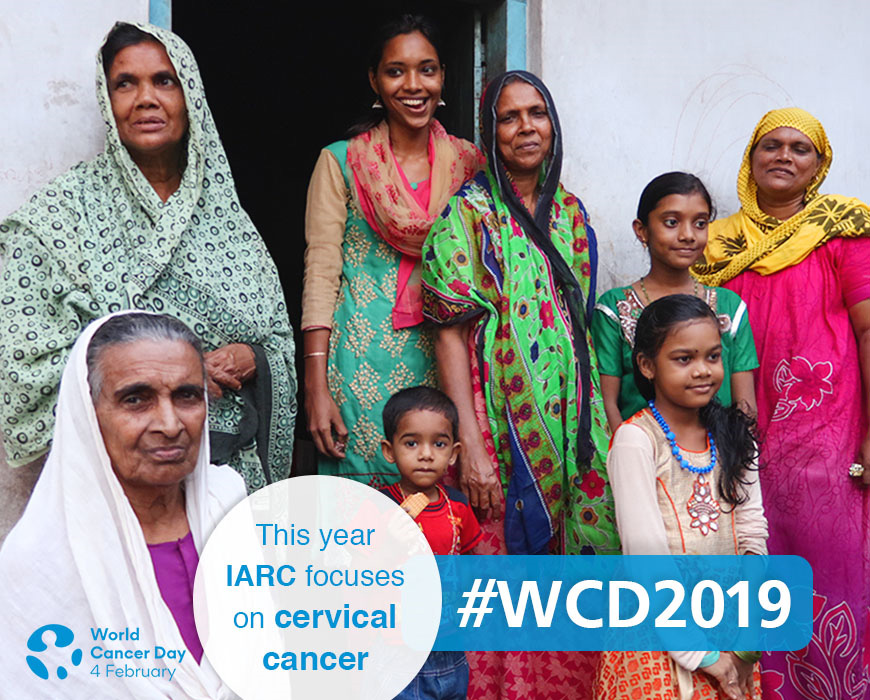Mobile cervical cancer screening in Pune city, India.
In Pune city, Maharashtra, India, IARC has provided technical support to an innovative cancer cervical project run by Prayas, a local nongovernmental organization. A specially equipped van visits areas of the city so that women with limited access to health services can benefit from cervical cancer screening and treatment.
India: HPV vaccines and fighting cervical cancer.
In India, IARC is conducting research to better understand the causes of cervical cancer and to evaluate the most appropriate prevention strategies, diagnostic tools, and treatments to control the disease. In Pune district in Maharashtra, IARC is working closely with national institutions to evaluate the efficacy of fewer than three doses of HPV vaccine in protecting women against cervical cancer.
IARC ESTAMPA study and cervical cancer in Latin America.
The ESTAMPA study is an IARC-led international research project in Latin America to evaluate approaches to organized HPV-based cervical screening and reduce cervical cancer mortality in the region.
Developing a model for cancer screening in Udaipur, India.
Breast cancer, oral cancer, and cervical cancer are the most common cancers in India. IARC has partnered with GBH American Hospital, Udaipur, to develop an innovative comprehensive model to screen people for common diseases and educate them about noncommunicable diseases such as diabetes, hypertension, breast cancer, oral cancer, and cervical cancer. If successful, the model could be used in other places where access to services is limited.
Dr Carolina Wiesner – ESTAMPA, Colombia.
Dr Carolina Wiesner of the National Cancer Institute of Colombia describes the IARC-led ESTAMPA study in Latin America, which evaluates cervical cancer screening and triage methods. The study also assesses the challenges of implementing such screening programmes, and offers proposals to help establish them in different scenarios.
Dr Laura Mendoza – ESTAMPA study.
Dr Laura Mendoza of the National University of Asunción, Paraguay, presents the ESTAMPA study, which aims to reduce deaths from cervical cancer. IARC is coordinating the study in 11 countries in Central and South America. The study enables countries to assess new screening programme models and gives researchers greater access to international training and networks.
Dr Gilles Travé – Novel Papillomaviruses.
Dr Gilles Travé of the Institute of Genetics and Molecular and Cellular Biology in Strasbourg, France, gives an overview of his work on the structure of proteins related to tumour-causing viruses and how he collaborates with IARC to explore the potential carcinogenicity of new papillomaviruses.
Dr Matti Lehtinen – Community-randomized trial database and HPV vaccination
Dr Matti Lehtinen of the University of Tampere, Finland, notes how IARC models were used and validated in Finland to determine the most feasible approach to reducing the HPV burden. This is important for high-income countries as well as low- and middle-income countries in designing HPV vaccination programmes.
Dr Ashrafun Nessa – Cervical and Breast Cancer Screening Programme.
Dr Ashrafun Nessa of Bangabandhu Sheikh Mujib Medical University Hospital, Bangladesh, discusses the challenges of addressing cervical cancer, which is responsible for one quarter of cancer deaths in Bangladesh, and explains how the government is tackling the disease and how IARC is helping with the project.
Dr Bruce Armstrong, The University of Sydney School of Medicine
Dr Bruce Armstrong, Senior Visiting Scientist at IARC and “arguably the most outstanding public health scientist in the history of Australian epidemiology” according to the Australian Academy of Science, sat down with us to explain how Australia has achieved one of the world’s lowest incidence rates of cervical cancer, to explain how other countries can reduce their own burden of cervical cancer and to share his message for World Cancer Day 2019.
